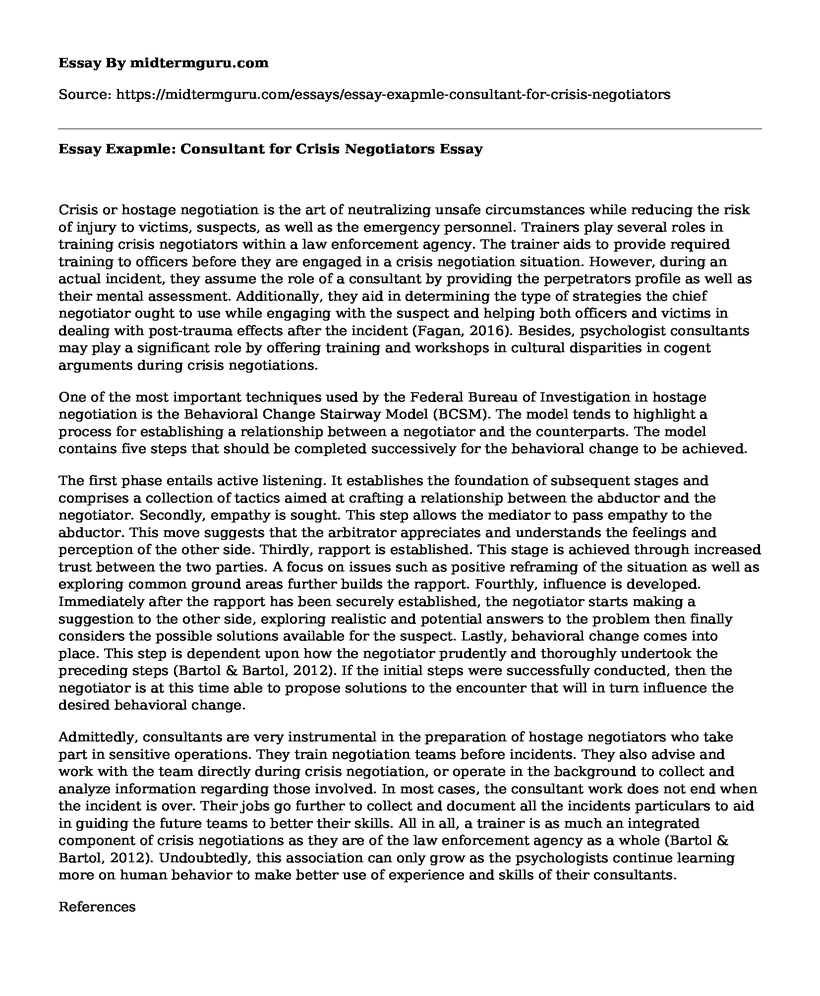Crisis or hostage negotiation is the art of neutralizing unsafe circumstances while reducing the risk of injury to victims, suspects, as well as the emergency personnel. Trainers play several roles in training crisis negotiators within a law enforcement agency. The trainer aids to provide required training to officers before they are engaged in a crisis negotiation situation. However, during an actual incident, they assume the role of a consultant by providing the perpetrators profile as well as their mental assessment. Additionally, they aid in determining the type of strategies the chief negotiator ought to use while engaging with the suspect and helping both officers and victims in dealing with post-trauma effects after the incident (Fagan, 2016). Besides, psychologist consultants may play a significant role by offering training and workshops in cultural disparities in cogent arguments during crisis negotiations.
One of the most important techniques used by the Federal Bureau of Investigation in hostage negotiation is the Behavioral Change Stairway Model (BCSM). The model tends to highlight a process for establishing a relationship between a negotiator and the counterparts. The model contains five steps that should be completed successively for the behavioral change to be achieved.
The first phase entails active listening. It establishes the foundation of subsequent stages and comprises a collection of tactics aimed at crafting a relationship between the abductor and the negotiator. Secondly, empathy is sought. This step allows the mediator to pass empathy to the abductor. This move suggests that the arbitrator appreciates and understands the feelings and perception of the other side. Thirdly, rapport is established. This stage is achieved through increased trust between the two parties. A focus on issues such as positive reframing of the situation as well as exploring common ground areas further builds the rapport. Fourthly, influence is developed. Immediately after the rapport has been securely established, the negotiator starts making a suggestion to the other side, exploring realistic and potential answers to the problem then finally considers the possible solutions available for the suspect. Lastly, behavioral change comes into place. This step is dependent upon how the negotiator prudently and thoroughly undertook the preceding steps (Bartol & Bartol, 2012). If the initial steps were successfully conducted, then the negotiator is at this time able to propose solutions to the encounter that will in turn influence the desired behavioral change.
Admittedly, consultants are very instrumental in the preparation of hostage negotiators who take part in sensitive operations. They train negotiation teams before incidents. They also advise and work with the team directly during crisis negotiation, or operate in the background to collect and analyze information regarding those involved. In most cases, the consultant work does not end when the incident is over. Their jobs go further to collect and document all the incidents particulars to aid in guiding the future teams to better their skills. All in all, a trainer is as much an integrated component of crisis negotiations as they are of the law enforcement agency as a whole (Bartol & Bartol, 2012). Undoubtedly, this association can only grow as the psychologists continue learning more on human behavior to make better use of experience and skills of their consultants.
References
Bartol, C. R., & Bartol, A. M. (2012). Introduction to forensic psychology: Research and application. Thousand Oaks, CA: Sage Publications.
Fagan, T. J. (2016). Psychologists as Crisis Negotiators? | The National Psychologist. Retrieved from http://nationalpsychologist.com/2016/02/psychologists-as-crisis-negotiators/102029.html
Cite this page
Essay Exapmle: Consultant for Crisis Negotiators. (2021, May 21). Retrieved from https://midtermguru.com/essays/essay-exapmle-consultant-for-crisis-negotiators
If you are the original author of this essay and no longer wish to have it published on the midtermguru.com website, please click below to request its removal:
- Essay on Culture of Competitiveness According to Gordon Lankton
- My Experience in Transformational Leadership - Essay Example
- Mammogram Promotion Program - Paper Example
- Strategic Urbanization of Information Systems and Planning - Research Paper
- Future of Global Church: Impact of Ecclesial Movements - Essay Sample
- Organizational Culture: Adhocracy Culture Promotes Creative Work Environment - Essay Sample
- Leadership: Essential Skills for Effective Commanders - Essay Sample







